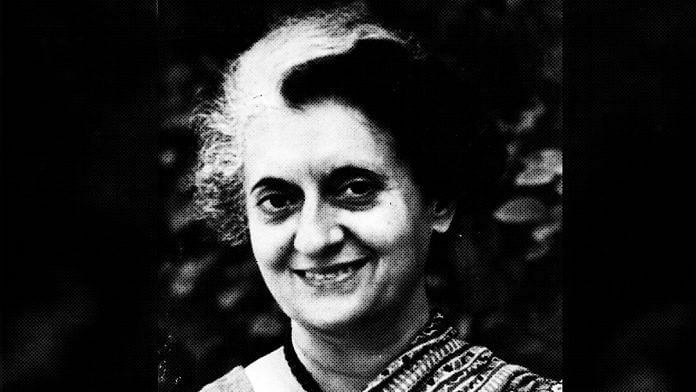New Delhi: Exactly 50 years ago, on 19 July, Prime Minister Indira Gandhi brought in the Banking Companies (Acquisition and Transfer of Undertakings) Ordinance in Parliament to nationalise the 14 largest commercial banks in the country.
Less than a week later, on 25 July 1969, the government introduced a Bill in the Parliament to nationalise banks.
Though the Bill was eventually passed in the Parliament, it faced stiff opposition from a few members. Leading the charge were Swatantra Party leader Minoo Masani and former PM Atal Bihari Vajpayee, then a Bharatiya Jana Sangh MP. Other MPs who raised their voice against the Bill were S.S. Kothari from Mandsaur, Madhya Pradesh, and Balraj Madhok from Delhi.
The opposition was both against the content of the Bill and the manner in which it was introduced. ThePrint takes a look at what some of these leaders said against the Bill.
Masani was the first MP to raise objections against the Bill. Such a step, he argued, would make it difficult for India to get foreign capital.
Also read: If Modi wants a real legacy, he must undo Indira Gandhi’s disastrous bank nationalisation
“The economic reason why we oppose this Bill is that it is bad for the economy of this country and it will ruin it further. Confidence in this country abroad will be badly shaken and the foreign capital and the help that we need will be endangered,” Masani said.
“At home, both the depositors and borrowers who today enjoy freedom of choice between various banks will now face one soulless monopoly. The first result of this will be that the bank deposits in this country will shrink because the common depositor, the small man, will not have faith in a Government which has so far shown that whatever is nationalised has three evils: one, that it is subject to bureaucratic red-tape and inefficiency; second, that it is subject to political influence, graft and corruption; and third, that inevitably almost all State enterprises make a loss”.
Masani even said the Bill was a step towards further consolidating power in the hands of “one person”.
“There are reports already that the Reserve Bank which has enjoyed an autonomy is now going to be reduced to a subservient wing of the Ministry of Finance. There are other reports that Intelligence will be taken away from the Home Minister and transferred to the hands of the Prime Minister. These are steps one by one, to concentrate political power in the hands of one person,” he had said.
He also argued the Bill was a step towards imposition of dictatorship in the country.
Also read: 50 yrs of nationalisation: Is Modi govt worsening PSU banks’ problems or resolving them?
“Democracy is majority rule after full consideration and dispassionately listening to the point of view of the minority. All these processes have been vitiated and nationalisation has come like a thief. It should have come in broad daylight, but it has come in the dark, like a thief, in the night. In the light of this, we look upon this Bill as one step towards the establishment of a dictatorship in this country.”
Vajpayee, on the other hand, was particularly critical of the haste with which the Bill was introduced in the Parliament.
“No one can challenge the right of this legislature to enact a law…But one question demands consideration. What wrong can happen if we wait for the decision of the Supreme Court. Isn’t it possible that after the court’s decision we may have more suggestions, some of which might be really important for inclusion in the bill…But the government is not ready to wait for that decision,” he said.
“What’s the point of so much haste…I want to appeal to you (Deputy Speaker) that today you have the opportunity to protect the rules and safeguard the rights of the minority along with the majority.”
Like Masani, Kothari also outlined both economic and political reasons behind his opposition to the Bill. Calling bank nationalisation a “shock”, he argued it would cripple India’s economy.
“I would submit that shocks like this, if administered to this crisis-ridden economy which has not yet been extricated fully out of the morass of recession, would result in crippling economic growth. It would have serious deleterious effects on future growth and the stage of self-sustaining growth and take-off that we have been envisaging for so long, would be put off for considerable time to come,” Kothari said.
He also said the Bill was mostly a result of political considerations. “What I would stress is that it is politically motivated. The Prime Minister has been playing in the hands of her Communist friends. That is fraught with serious danger.”
Madhok was also quite prescient in his observation about bank nationalisation leading to corruption in sanctioning of bank loans.
“Just like bribes are given to avail quota-permits, the same will now happen for bank loans…State monopoly is worse than any private monopoly and you are making banking a State monopoly. It is an anti-people Bill; it is an anti-country Bill; It is an anti-employees Bill; it is an anti-depositors Bill and it will destroy the economy of the country,” he said.
Also read: Political stunt? Why Indira Gandhi’s bank nationalisation was questioned even 50 years ago



